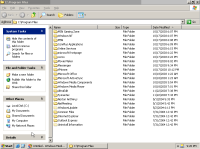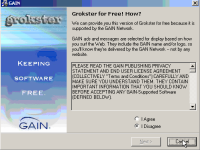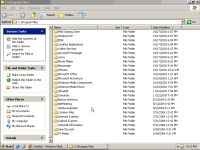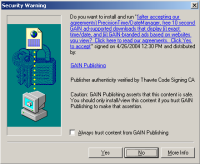I’ve recently been looking at the unwanted software installed by Grokster (a peer-to-peer filesharing program). Eric Howes has documented Grokster’s exceptionally large bundle, which includes Claria, 411 Ferret/ActiveSearch, AdRoar, Altnet/BDE, BroadcastPC, Cydoor, Flashtrack, MyWay/Mybar, SearchLocate/SideBar, Topsearch, TVMedia, VX2/ABetterInternet, Browser Hijack, two different TopMoxie programs (branded by WebRebates), and several other programs not yet identified.
These programs, in combination, place a major burden on users’ computers: Loading and running so many extra tasks leaves less memory, less bandwidth, and less CPU time for whatever users actually want to do. My lab PCs are fast and well-maintained, but installing Grokster and its bundle makes them sluggish and hard to use. Worse, it’s hard to undo the damage Grokster and its partners cause: Eric also tracks, in unprecedented detail, how even the newest spyware removal applications can’t get rid of all the programs Grokster installs. It’s a mess, Eric’s site explains, and he’s surely right.
But as it turns out, the situation is even worse than Eric realized. As Eric explains, Grokster installs lots of junk if a user presses Accept. However, Grokster also installs software even if the user presses Cancel! That’s right: If a user has second thoughts after seeing the long license agreements, and if the user decides to press Cancel, Grokster’s installer nonetheless installs SearchLocate/SideBar and TVMedia. See the screen-shots below, taken from my video (WMV, 1MB) of the install process. (For best viewing, watch video in full-screen mode.)
Equally outrageous are the extraordinarily lengthy license agreements Grokster and its partners ask users to accept. First comes a Claria license agreement that takes, by my count, 120 distinct screens (119 presses of the page-down key) to view in full. As shown in the Grokster installer, Claria’s license has grown to an incredible 6,645 words. So Claria’s current license is 43% longer than the US constitution — before we count the nine separate web pages Claria’s license references, some of them quite lengthy, but which Claria nonetheless claims are “incorporated by reference.” Furthermore, Claria’s license is growing rapidly: When I prepared screen-shots of Claria’s license, as shown by Kazaa in June 2004, the license was 5,541 words long. If Claria’s license continues to grow by 20% every four months, it will be 11,500 words long in October 2005, and 34,300 words long in October 2007. Maybe Claria’s lawyers get paid by the word.
And it gets worse: Grokster installs other programs, with their own licenses, and Grokster shows these many licenses en masse in a subsequent screen. These licenses appear in a text box that, for whatever reason, doesn’t let me to copy its text to the clipboard. So I can’t know the precise word count of the licenses in this second box. But I do know it took 278 page-downs to view the entire license.
That makes a total of 398 page-downs for any user who wants to know what lies in store upon installing Grokster. 398!
This past week, the US House of Representatives passed two bills that purport to address the spyware problem. Would they do anything about Grokster’s outrageous activities?
Goodlatte‘s H.R.4661 prohibits unauthorized software installation — but only under specific, narrow circumstances. I can’t immediately say that SearchLocate/SideBar and TVMedia are used in furtherance of a Federal criminal offense, so Sec.2.(a) is inapplicable. And I can’t say that the programs intentionally obtain or transmit personal information with the intent to defraud, injure, or cause damage. Surely the programs’ authors would deny any such intent. So Sec.2.(b) is inapt too. Looks like Goodlatte’s bill wouldn’t help.
Bono‘s H.R. 2929 does prohibit the unauthorized software installation. Sec.2.(a)(4)(A) specifically bans installing software when a user declines installation. Score one for the good guys.
But suppose Grokster ended the truly outrageous installation of software even when users press Cancel, instead installing its bundle only when users press Accept. (Grokster will more than likely make this change after reading my article.) Then Grokster would be, I fear, substantially compliant with H.R.2929.
For 2929’s purposes, it doesn’t matter that Grokster installs so much software that it essentially ruins even an above-average PC. The bill’s Sec.3. approves of the installation of fifteen programs, or a hundred and fifteen, so long as the user is first shown a single notice that warns “This program will collect information about Web pages you access and will use that information to display advertising on your computer. Do you accept?’ Or, thanks to a recent revision to the bill, the installer can show some other text, so long as it is “substantially similar,” but even if it is more complicated, more confusing, or harder to understand.
I worry that Grokster can and will include the brief disclosure 2929 specifies, or an alternative text that makes the installation sound even more unobjectionable. Then all too many users will be tricked into accepting Grokster’s massive software bundle, and they will find their PCs grind to a halt under the load Grokster and its partners impose. Users will be running Bono-certified software, 100% compliant with relevant law (should Bono’s bill in fact become law). But their computers will be nearly useless nonetheless.
If I were revising Bono’s bill, I’d seek to tighten its requirements. I certainly wouldn’t permit watered-down “substantially similar” disclosures. I’d also prohibit the installation of a bundle of software, where the user requested only a single program, if that bundle has significant adverse effects on the speed and reliability of a typical computer, and if that bundle has no substantial relationship to the software the user initially requested. For bundled programs that show advertising, I’d require that the installation provide a sample of each kind of advertisement to be shown, and I’d require that the installation disclose the typical frequency of ad displays. In short, there are lots of creative ways to tighten the language, so that programs can’t satisfy the bill’s requirements while continuing to trick users into unwanted installations.
Instead, 2929 takes a narrower approach — admittedly stopping a class of outrageous behaviors, but letting all too many continue. Given the bill’s preemption of tougher state laws, this is legislation that, far from stopping spyware, in many respects makes the spyware problem worse.
Can we count on the Senate to close the loopholes in the bills as passed? News coverage suggests that these bills are a done deal already. And Congress has enacted weak legislation before (e.g. CAN-SPAM). So I’m not holding my breath.










